
Journal of Stem Cells & Regenerative Medicine
Scope & Guideline
Bridging Research and Clinical Practice
Introduction
Aims and Scopes
- Stem Cell Biology and Mechanisms:
Focuses on the fundamental biology of various stem cell types, including their differentiation pathways, signaling mechanisms, and the molecular underpinnings that govern stem cell behavior. - Regenerative Medicine Applications:
Covers research on the therapeutic applications of stem cells in regenerative medicine, including tissue engineering, wound healing, and organ repair. - Cell Therapy Innovations:
Explores advancements in cell therapy techniques, including the use of mesenchymal stem cells (MSCs) and their derivatives for treating various medical conditions. - Extracellular Vesicles and Secretomes:
Investigates the role of stem cell-derived extracellular vesicles and secretomes in mediating therapeutic effects and their potential as cell-free therapies. - Clinical Trials and Safety Studies:
Includes clinical research and trials assessing the safety and efficacy of stem cell therapies, emphasizing translational research from bench to bedside.
Trending and Emerging
- Exosome and Secretome Research:
There is a growing emphasis on the therapeutic potential of exosomes and secretomes derived from stem cells, highlighting their use as cell-free therapies and their role in mediating regenerative effects. - Cancer Stem Cells and Metastasis:
Research on cancer stem cells, particularly their role in tumor metastasis and treatment resistance, is gaining traction, reflecting the need for innovative approaches to cancer therapy. - Personalized Medicine Approaches:
The integration of personalized medicine in stem cell therapies, considering donor characteristics and patient-specific factors, is emerging as a significant theme in recent studies. - Regenerative Strategies for Specific Conditions:
Increasingly, the journal features studies on targeted regenerative strategies for specific conditions, such as osteoarthritis and urethral strictures, showcasing a shift towards tailored therapeutic interventions. - Gut-Brain Axis and Stem Cells:
Research connecting the gut microbiome and gut-brain axis with stem cell therapy is on the rise, indicating an interdisciplinary approach to understanding health and disease.
Declining or Waning
- Traditional Stem Cell Sources:
Research on traditional sources of stem cells, such as embryonic stem cells, has seen a decline in favor of more innovative and ethically acceptable sources, such as induced pluripotent stem cells (iPSCs) and adult-derived stem cells. - Basic Preclinical Studies:
There is a noticeable reduction in purely basic preclinical studies, as the journal increasingly emphasizes translational research that directly connects laboratory findings to clinical applications. - Single Cell Studies:
Research focusing on single cell analysis within stem cell populations is becoming less frequent, possibly due to the rising interest in bulk analysis methods and population-level characteristics. - Non-therapeutic Stem Cell Research:
Interest in non-therapeutic investigations of stem cells, such as purely developmental biology studies without direct clinical implications, appears to be waning.
Similar Journals

Current Stem Cell Research & Therapy
Pioneering Research for a Healthier FutureCurrent Stem Cell Research & Therapy, published by Bentham Science Publishers Ltd, is a leading journal dedicated to advancing the field of stem cell research. With an ISSN of 1574-888X and an E-ISSN of 2212-3946, this journal has been a valuable resource since its inception in 2006 and continues to broaden its scope through 2024. Recognized in the Q2 quartile for Medicine (miscellaneous) and ranked in the 66th percentile among its peers, the journal plays a crucial role in disseminating high-quality, peer-reviewed research that explores both the therapeutic and biological implications of stem cells. Located in the United Arab Emirates, Current Stem Cell Research & Therapy embraces a global audience of researchers, professionals, and students, providing a vibrant platform for discourse and innovation. While the journal offers subscription-based access, it remains committed to enhancing the scientific community's understanding of stem cell therapy and its applications across various medical fields.

American Journal of Stem Cells
Exploring the frontiers of cellular therapies and regenerative methodologies.American Journal of Stem Cells is a leading multidisciplinary publication dedicated to advancing the field of regenerative medicine and stem cell research. Published by E-CENTURY PUBLISHING CORP, this journal has gained recognition for its commitment to high-quality scientific contributions, achieving impressive rankings within the Scopus database, particularly in the areas of Biochemistry, Genetics and Molecular Biology, and Developmental Biology. With its focus on innovative research, the journal offers crucial insights and developments that appeal to researchers, professionals, and students alike. Although it is not an open-access journal, the American Journal of Stem Cells plays a pivotal role in disseminating impactful findings that define the future of cellular therapies and regenerative methodologies. The journal's past coverage from 2012 to 2017 reflects its dedication to advancing knowledge in key scientific disciplines, making it an essential resource for anyone engaged in the dynamic landscape of stem cell science.

Tissue Engineering and Regenerative Medicine
Connecting Research and Practice in Biomedical InnovationTissue Engineering and Regenerative Medicine, published by the Korean Tissue Engineering Regenerative Medicine Society, is a distinguished journal focusing on the interdisciplinary fields of tissue engineering, regenerative medicine, and related biomedical innovations. With an ISSN of 1738-2696 and an E-ISSN of 2212-5469, this journal disseminates cutting-edge research and advancements pivotal to developing therapeutic strategies that improve tissue function and repair. As a testament to its scholarly impact, it holds a Q2 ranking in both Biomedical Engineering and Medicine (miscellaneous) categories, reflecting its influence and relevance within the scientific community, particularly with a Scopus rank placing it in the 82nd percentile among similar journals. Although the journal does not offer open access, it provides vital insights and knowledge to researchers, professionals, and students involved in the quest for innovative solutions in medical science and engineering. With its convergence years extending from 2008 to 2024, the journal continues to be an essential platform for the dissemination of high-quality research that drives the field forward.
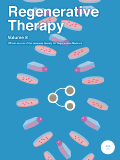
Regenerative Therapy
Elevating the discourse on regenerative therapies worldwide.Regenerative Therapy is a premier open-access journal dedicated to advancing the fields of biomaterials, biomedical engineering, and developmental biology. Published by Elsevier in Japan, this journal has been an influential platform since its inception in 2015, contributing significantly to the global discourse on regenerative medicine. With an impressive Q2 ranking in major categories such as Biomaterials and Biomedical Engineering, it is recognized for its quality of research and innovation. Researchers seeking to disseminate their findings or explore cutting-edge developments will find Regenerative Therapy to be invaluable, reflecting current trends and fostering collaborations across interdisciplinary boundaries. The journal offers open access, ensuring that high-quality research is available to a broad audience and enhances the impact of scholarly work in the regenerative medicine community.
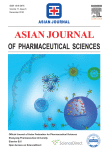
Asian Journal of Pharmaceutical Sciences
Advancing pharmaceutical knowledge for a healthier tomorrow.Asian Journal of Pharmaceutical Sciences is a prestigious open-access journal published by Shenyang Pharmaceutical University, dedicated to advancing research and developments in the field of pharmaceutical sciences. Since its inception in 2009, the journal has successfully converged a wealth of knowledge and innovation, demonstrating an impressive track record with its open access model adopted in 2013, ensuring global dissemination of crucial research findings. With an outstanding impact factor and consistently ranked in the Q1 category for both Pharmaceutical Science and Pharmacology in 2023, it ranks among the top journals in its field, as evidenced by its impressive Scopus rankings—4th out of 183 in Pharmaceutical Science and 10th out of 313 in Pharmacology, showcasing its high relevance and credibility (98th and 96th percentiles respectively). Researchers, professionals, and students can access a diverse array of articles that encompass groundbreaking studies, reviews, and reports, solidifying the journal's position as a vital resource for anyone engaged in pharmaceutical research. With its commitment to quality and accessibility, Asian Journal of Pharmaceutical Sciences plays an essential role in fostering innovation and collaboration within the global scientific community.
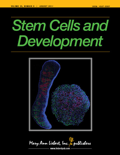
STEM CELLS AND DEVELOPMENT
Advancing the Frontiers of Stem Cell ResearchSTEM CELLS AND DEVELOPMENT, published by Mary Ann Liebert, Inc., is a leading peer-reviewed journal dedicated to the rapidly advancing fields of stem cell biology and developmental science. With an ISSN of 1547-3287 and an E-ISSN of 1557-8534, the journal encompasses a broad range of topics central to understanding stem cells' roles in development and regeneration processes. It holds a prestigious standing within its category quartiles, ranking Q3 in Cell Biology, Q2 in Developmental Biology, and Q2 in Hematology for 2023. With its convergence from 2004 to 2024, STEM CELLS AND DEVELOPMENT fosters an innovative platform for researchers, professionals, and students to disseminate groundbreaking research, share insights, and explore novel therapeutic approaches. Open access options enhance the journal's visibility and accessibility, promoting a collaborative exchange of information among the scientific community. Positioned at the forefront of stem cell research and its applications, this journal is vital for anyone seeking to stay informed about the latest advancements and trends within these critical areas of study.

Stem Cell Reviews and Reports
Transforming Understanding of Stem Cells and CancerStem Cell Reviews and Reports is a prestigious journal published by SPRINGER specializing in the dynamic field of stem cell research, encompassing various aspects of cell biology and cancer research. With an ISSN of 2629-3269 and E-ISSN of 2629-3277, this journal serves as an essential resource for academics, offering insightful reviews and cutting-edge reports from 2009 to 2024. The journal has achieved a commendable Q2 ranking in both Cancer Research and Cell Biology categories as of 2023, highlighting its significant contribution to the scientific community. Additionally, with Scopus rankings placing it in the 74th percentile for both biochemistry and cell biology, it is recognized for its high-quality articles that foster innovative approaches in stem cell therapy and regenerative medicine. As an Open Access publication, Stem Cell Reviews and Reports ensures that its comprehensive content is readily available to researchers, professionals, and students, promoting collaboration and advancement in this vital area of study.

Stem Cell Research & Therapy
Empowering Innovation in Stem Cell ScienceStem Cell Research & Therapy is an esteemed international journal published by BMC, specializing in the rapidly advancing fields of stem cell research and regenerative therapies. Since its inception in 2010, the journal has embraced an Open Access model, ensuring that vital research is readily accessible to a global audience. With a significant impact in the scientific community, it holds Q1 quartile rankings in prestigious categories such as Biochemistry, Genetics and Molecular Biology, Cell Biology, and Molecular Medicine, highlighting its critical role in promoting groundbreaking research. The journal’s high Scopus rankings—placing it in the top echelons of its fields—reflect its commitment to publishing high-quality, peer-reviewed studies that advance our understanding of stem cell biology and therapeutic applications. Aimed at researchers, healthcare professionals, and students alike, Stem Cell Research & Therapy is an indispensable resource for those dedicated to the exploration and innovation within this transformative area of science.
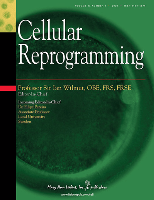
Cellular Reprogramming
Exploring New Frontiers in Stem Cell ResearchCellular Reprogramming is a prominent academic journal published by MARY ANN LIEBERT, INC, dedicated to advancing the field of cellular biology and biotechnology. With its ISSN 2152-4971 and E-ISSN 2152-4998, this journal provides an innovative platform for researchers and professionals to share groundbreaking research findings on cellular reprogramming, stem cell biology, and regenerative medicine. Established in 2010, and actively publishing until 2024, the journal is recognized for its contributions, evidenced by its categorizations in the Q3 and Q4 quartiles across several related fields, including biotechnology and developmental biology. This peer-reviewed journal not only supports open access to scientific literature but also aims to enhance interdisciplinary collaboration among scientists. With a growing impact in the realms of biochemistry, genetics, and molecular biology, Cellular Reprogramming remains an essential resource for the dissemination of pioneering research that could shape the future of cellular therapies.
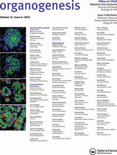
Organogenesis
Shaping the Future of Biomedical Engineering and Transplantation.Organogenesis is a leading journal published by Taylor & Francis Inc, dedicated to advancing the field of developmental biology and regenerative medicine. With an ISSN of 1547-6278 and E-ISSN 1555-8592, this journal spans an extensive research scope that includes embryology, transplantation, and biomedical engineering, distinguishing itself as a crucial platform for researchers and practitioners alike. Its impact is reflected in its performance across various categories in 2023, earning Q3 rankings in Biomedical Engineering and Embryology, Q4 in Developmental Biology, and Q2 in Transplantation, showcasing its reputable standing among peer journals. Moreover, with Scopus rankings indicating strong positioning in the fields of medicine and biochemistry, Organogenesis is essential for those looking to publish or stay updated on pioneering research. The journal facilitates rigorous peer-review and offers a forum for disseminating innovative findings, making it an invaluable resource for academics, professionals, and students committed to understanding the complexities of organism development.